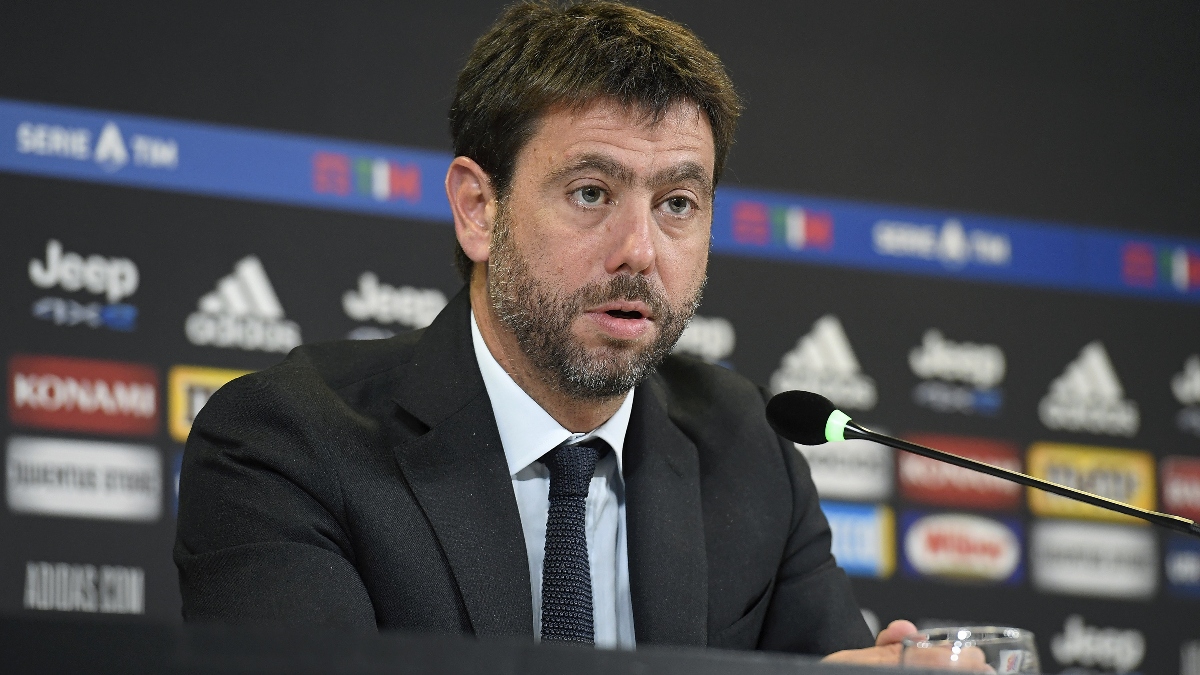What Is Soccer’s European Super League? What to Know and Why Everyone Hates it
Filippo Alfero – Juventus FC/Juventus FC via Getty Images. Pictured: Andrea Agnelli
- The newly-announced European Super League, made up of 12 major clubs in Europe with three more on the way, has caused major controversy over the last few days since its announcement.
- So what is the Super League, what does it mean for soccer fans, and why does everyone hate it? Michael Leboff sums it all up below.
The soccer world was shattered on Sunday night when 12 of the world's biggest clubs announced, in solidarity, that they would break away from UEFA (European soccer's governing body) to form a 20-team European Super League. The situation is still fluid, but here's what we know so far:
What Is the Super League?
The European Super League is a proposed soccer competition that would effectively attempt to replace the Champions League. The Super League would feature 20 teams, including 15 permanent members.
Twelve of the 15 "founding members" have been confirmed but the Super League plans to add three more permanent members and leave five spots open. Those open spots would be awarded to European clubs who qualify through their domestic competitions.
Who Is in the European Super League?
Twelve of the "founding members" released statements announcing their plans to breakaway from UEFA (European Soccer's governing body) and form the Super League late on Sunday night:
- Juventus
- AC Milan
- Inter Milan
- Barcelona
- Real Madrid
- Atletico Madrid
- Liverpool
- Manchester United
- Manchester City
- Tottenham Hotspur
- Arsenal
- Chelsea
The other three "founding members" have yet to reveal themselves, though everyone seems to have an idea of which teams are being targeted (the really rich, successful ones).
Most folks would have expected that Paris Saint-Germain would be involved in the Super League but there has been no confirmation from the club one way or the other yet, likely because Nasser Al-Khelafi, who runs Qatar Sports Investments (the owners of PSG) is on the UEFA Executive Committee. UEFA is unequivocal in its opposition to the Super League.
Porto, the biggest club in Portugal, confirmed they have rejected an invitation. Borussia Dortmund, one of Germany's biggest teams, has also said it has no intentions of joining the Super League and its chairman, Hans Joachim Watzke, has said that Bayern Munich, Germany's most iconic club, holds the same position as its domestic rival.
What Has the Response Been to the Announcement?
The announcement from the 12 "founding members" has led to a lot of outrage across the sports landscape. It is pretty hard to find anybody that supports the idea of a breakaway league, especially one that isolates itself without traditional promotion/relegation.
FIFA and UEFA have long said that they would ban players who join a breakaway league from playing in international competition (like the Euros and World Cup) and it didn't take long for UEFA president Aleksander Ceferin to confirm that stance:
"The players that will play in the Super League will be banned from playing in the World Cup and Euros," Ceferin said. "They will not be allowed play for their national teams."
Not only has the Super League been condemned by the likes of UEFA, The Premier League and the other top-flight competitions in Europe, but it has also been opposed by the Prime Ministers of France and Great Britain.
Why Does Everyone Hate the Super League?
There are a lot of reasons, from ideological to financial to political.
First and foremost, the European Super League has the potential to completely wreck Europe's soccer landscape. A closed-off competition would not only weaken the top of the European Football pyramid (The Premier League, La Liga, Serie A, etc.) but it would also do unknown damage to the lower leagues, as well.
The European Soccer pyramid has always remained open, allowing fans of smaller clubs to be able to dream that one day they would be able to climb to the top of the ladder. Taking that away and isolating 15 teams from the rest of the continent would basically crush one of the most romantic concepts in sport. The Premier League had this to say on the notion:
"The Premier League condemns any proposal that attacks the principles of open competition and sporting merit which are at the heart of the domestic and European football pyramid," said the statement. "Fans of any club in England and across Europe can currently dream that their team may climb to the top and play against the best. We believe that the concept of a European Super League would destroy this dream."
There's also plenty of geo-political reasons that the Super League is causing such outrage. While Juventus' owner/chairman Andrea Agnelli is the flag-bearer for the European Super League, it is worth noting that more than half of the 12 teams invited so far are owned by non-Europeans:
- Liverpool is owned by John Henry and Fenway Sports Group.
- Manchester United is owned by the Glazer Family (who also own the Tampa Bay Buccaneers).
- Arsenal is owned by Stan Kroenke (owner of the Los Angeles Rams, Denver Nuggets, Colorado Avalanche).
- Manchester City is owned by Sheikh Mansour bin Zayed Al Nahyan, the deputy prime minister of Abu Dhabi.
- AC Milan is owned by American businessman Paul Singer.
- Inter Milan is owned by Chinese businessman Zhang Jindong.
European soccer clubs are typically the heart of their community. A town or city's fortunes can rise or fall with their local club. Something tells me that an oil prince, the owner of the Red Sox and a Chinese billionaire won't lose sleep if their new Super League causes harm to places like Peterborough, Chievo or Eibar.
How would you rate this article?






